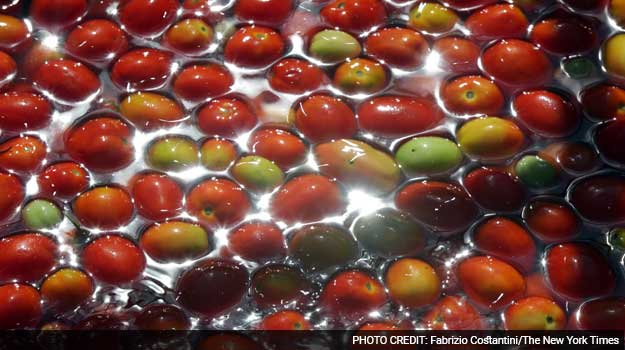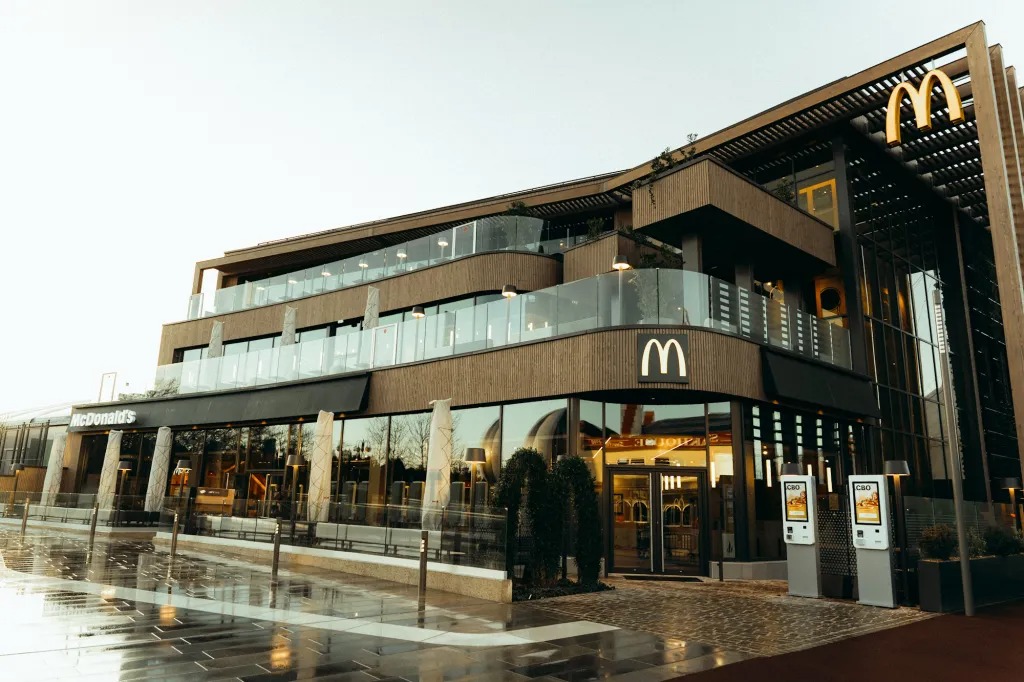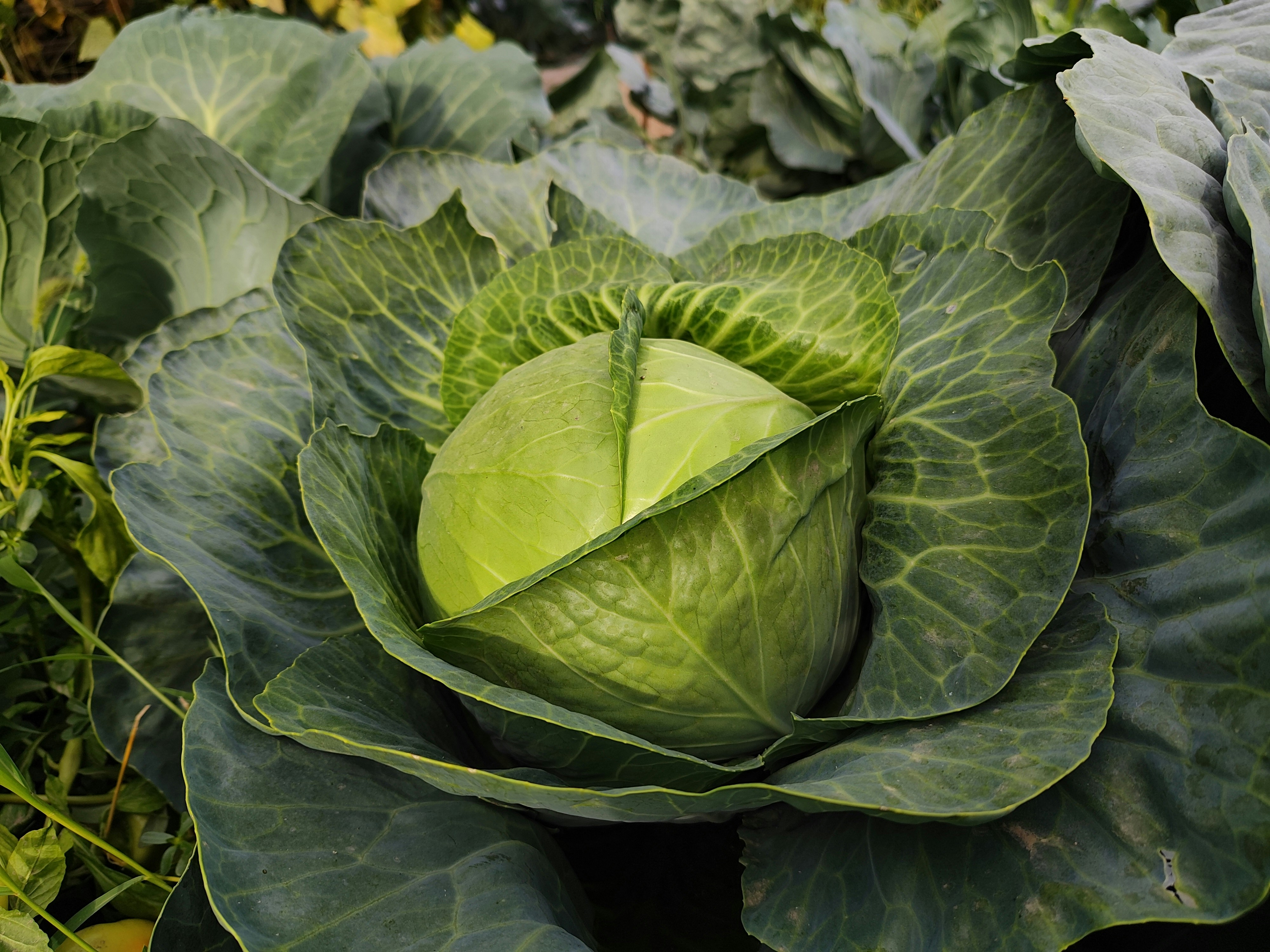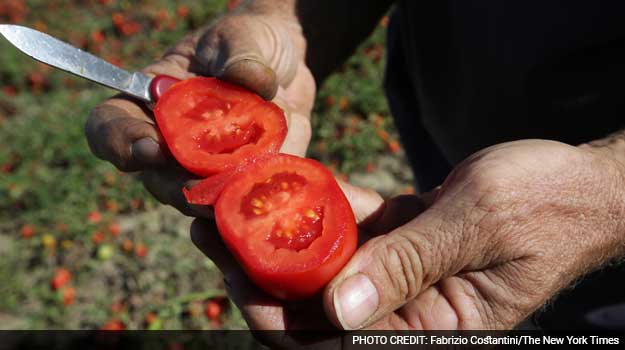Heinz has left a deep mark on this town, the self-proclaimed "tomato capital of Canada" that sits on the shore of Lake Erie.
There is the tourist booth shaped like a giant tomato that was partly funded by Heinz in 1961. The annual tomato festival that was originally a company picnic. Most everyone has a family member who has worked at the century-old Heinz plant here. Residents feared the worst when a group of investors bought Heinz in 2013. The investors, 3G Capital and Berkshire Hathaway, Warren E. Buffett's company, announced plans to close the plant and gave layoff notices to its 740 workers.
But Leamington - and the plant - got a reprieve because, in part, of a quirk of Canadian law. A 54-year-old regulation bans using tomato paste to make tomato juice. Although the plant has changed hands, Heinz is its biggest customer. Along with tomato juice, the plant now makes soups, sauces and SpongeBob SquarePants canned pasta. The air around downtown is still filled with the scent of cooked tomatoes.
"It's really quite unusual, this whole story," said David Dick, a tomato seedling grower whose family's dealings with Heinz date from 1936. "I'm really dumbfounded by it all. This really rose from the ashes."Sam Diab, who is one of three partners in the plant's new owner, Highbury Canco, is steeped in Heinz history.
It was the past that Diab, now the president and chief executive of Highbury Canco, fought to preserve. In October 2013, Diab got a warning that Heinz would announce the plant shutdown the next month. As he kept the secret, Diab plotted a plan to save the factory.
"You know, it was difficult when you have hundreds of people around you," said Diab, 33. "But, obviously, I saw a different future for the place."
Diab tried unsuccessfully to dissuade 3G and Berkshire Hathaway from closing the plant with a plan that included cost-cutting. The disruption went far beyond the factory. Heinz bought about half of Ontario's tomato crop, worth roughly $50 million a year.
A few miles north of the plant, Wayne Palichuk moved to save costs on the farming operation his grandfather founded 87 years ago. Growing tomatoes for Heinz generated about half of his farm's income.

He laid off a hired hand who had worked on the farm for years. He put some equipment up for sale. "Is there crops that we could grow that we could survive on?" Palichuk said. "Sure there is. Is there other crops with the same per acre value? No."
As Diab showed prospective buyers around the plant, he proposed that new owners focus on landing Heinz as a customer. But many of the visitors were simply looking to tear it down and redevelop the land. He similarly figured that Pradeep Sood and Surjit Babra, two investors from the Toronto area, did not have much interest.
Neither had any extensive experience in the food industry. Sood's main holding, XactScribe, is a transcription company. Babra's business, SkyLink Canada, has aviation-related holdings. "My heart wasn't in the tour," Diab said. "I didn't actually think it was going to go anywhere because they didn't have the background in food."
But the two investors called back the next day. Sood said they were particularly impressed that the plant came "with a trained, ready-made workforce." Within weeks, Diab formally partnered with them to make a bid for the plant, its equipment and, critically, contracts to continue using them to make Heinz products.
The Canadian rules around tomato juice helped win over Heinz. Tomato juice in the United States is often made from tomato paste, but Canadian regulations require fresh tomatoes. If Leamington closed, Heinz would have to find another place to produce tomato juice for Canada, where it dominates the market for the beverage.
The company's control of the Canadian market means there is little tomato juice production capacity elsewhere in the country. Keeping tomato juice production in Leamington also meant that custom machinery did not have to be duplicated.
Along with the plant sale, Heinz also signed a five-year agreement with Highbury to produce about 120 products. The warehouse will also continue to serve as the distribution center for all Heinz products sold in Canada regardless of where they are made. "Highbury Cano was identified as the ideal partner that would benefit both the Leamington community and Kraft Heinz," said Michael Mullen, a spokesman for Kraft Heinz, as the company is now known. "We continue to have a strong relationship with Highbury Canco."
At first, employment was cut to 250, from 740. Under a new union contract, the basic rate for unskilled plant workers fell to 16 Canadian dollars an hour, from about 25 Canadian dollars, although Highbury maintained similar benefits. The number of seedling growers and tomato farmers supplying the plant declined. Since then, local tomato farmers have secured additional contracts with other canning and paste companies in the area.
This year's harvest was back to about where it stood before the shutdown announcement. "Sam came through," said Palichuk, who remains a supplier, as does Dick. "He was a knight in shining armor."
It is a common sentiment, but bitterness lingers toward 3G and Buffett. Finishing lunch at the Gingerbread House Family Restaurant, Joanne Siddall, a former plant worker, said she boycotts Tim Hortons, the national coffee and doughnut chain that was bought by the 3G-owned Burger King Worldwide using financing from Berkshire Hathaway. The cuts have led to small-town rumors and speculation. Siddall subscribes to a common conspiracy theory in which the sale of the plant was a sham to force lower wages. "They've got another four years, and they'll be done, and then Heinz will take back over," she said.
Buffett denies such a plan. "This is the first I've heard of the conspiracy theory," he wrote in an email in which he also noted that 3G was responsible for the operation of Heinz. "I am on the board of Kraft Heinz and can state unequivocally that I know of no arrangement of any kind to buy back the property." A spokesman for 3G declined to comment.
Diab's focus is expansion. This year, Highbury landed a contract to produce industrial tomato paste for a local canning company, allowing Diab to raise employment to 325. Sales in 2015 will be roughly 75 million to 120 million Canadian dollars, according to Diab.
Part of Diab's plan is to start exporting industrial paste to food companies in nearby Ohio and Michigan. That hinges, in part, on convincing the tomato growers' marketing board to create a lower price category for paste tomatoes.
Diab is also pitching the product development laboratory, inherited from Heinz, to smaller food companies as a way to scale up new products for test runs. The company is investing about 20 million Canadian dollars into outfitting empty sections of the plant to allow new kinds of packaging. "Now, it's all about securing new products, and that's new for us," Diab said. © 2015 New York Times News Service







